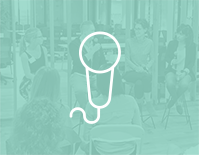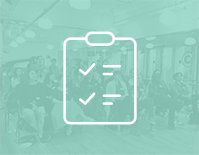Eriol Fox on their experience as an underrepresented speaker advocating for diversity and inclusion
As part of our #WTDSpeakerStories, we spoke with Eriol Fox about their journey as a speaker advocating for inclusion and representation in the open-source software and humanitarian community. Here is what they has to share with us about their experience.
As part of our Women Talk Design Speaker Stories series, we’re interviewing a Women Talk Design speaker every week about their journeys and experiences. We talk to speakers who are just getting started, speakers who have had their fair share of speaking mishaps, speakers writing books, and speakers curating events. At the end, we offer an opportunity for folks from the WTD community to ask their own questions and connect with each other. Visit our events page for more information about the series and RSVP for our next event.

Eriol Fox (they/them) has been working as a designer for 10 years, most recently focusing on the Humanitarian, FOSS (free and open-source software) and human rights technology space. During their master’s degree, they investigated the user experience journey of people with terminal illnesses and the people that care for them and are now a PhD candidate investigating designers participation in humanitarian topics globally through open-source software. Eriol is a non-binary/genderfluid, queer person who uses they/them pronouns and who, in their talks, often covers LGBTQ+ representation in visual design.
On their beginning as a speaker and why they speak
Eriol talked about their experience in art school as laying a comfortable foundation for speaking before they even moved into the design world.
“It wouldn’t be right of me to say that I don’t have a background, to some extent, in being on stage. I did an art degree and quite a lot of that art degree was performance related so, to be fair, when you are able to go out into the street and do some performance getting up on stage, talking about the professional work that you do becomes a lot less scary.”
Eriol highlighted how a passion for diversity has driven their journey as a speaker.
“I still talk a lot about diversity and inclusion. [That] was how I got into speaking. I really wanted to focus on what it means to us as designers – diversity and inclusion – and what day to day things does wanting to be more diverse and include better representation mean for us.”
“So I started making notes for myself and trying to put things into practice. I did a couple of speaking [engagements] at my university as a graduate talking about my career path before I actually did my first tech conference…And that was a comfortable first couple of speaking gigs.”
After their university experience, Eriol’s said their desire to continue speaking grew from their first positive experience at a tech conference focused on diverse voices.
“I feel like there was definitely a moment where it became less of a scary prospect for me as a professional. The big conference that I did where it solidified why I wanted to continue…was the first Non Binary in Tech conference…They really wanted to give a platform to all the different people that identify as non binary or gender fluid. It was a fantastic event and it was one of the first times where I got amazing feedback. It was really the moment where I felt like, “Okay, I kind of know how to do this now.’ And it was well-received and I got hooked.”
Eriol discussed how they aren’t focusing on speaking for income, but rather viewing it as a way to explore topics they care about – not only as a contributor, but also as a learner.
“The reason that I speak is more because I have certain things that I’ve learned or certain things that I’ve done that I literally cannot stay quiet about. And people have told me, ‘Yeah, that’s really interesting and I’d want to learn more about that’ and that’s typically why I choose the things that I choose to speak about.”
“So think about what your reasons for speaking are, whether it’s about sharing something with a particular community, experiencing a particular community, or learning from another community. One good reason for pitching certain events might be…I really want to learn from the community there as well as hopefully offer some of my insight.”
On finding and selecting speaking engagements
As Eriol’s speaking life has evolved, so has the way they approach engagements. With experience has come insight into evaluating events.
“It wasn’t until very recently that I started getting people [who] seek [me] out. I still pitch as well – I think it’s really important to balance the two or go for the one that you find most comfortable. There’s no right or wrong way to do it essentially.”
“I am a bit more considerate about where I want to speak. I have started to think about what speaking at a particular conference on a particular topic is going to do for me as a speaker. And also the harder topic of, ‘What does that community want or need?’ I tend to trust the conference organizers when they want something because my understanding is that they know that community or the attendees will find value in that topic. But it’s good to check.”
Eriol recommended looking at the sponsors for an event as well as the organizers for signs they align with your values.
“Another thing that I personally look for, which is definitely a personal thing, is who’s sponsoring the event. Look at the sponsors [and] you can [potentially] find out that this conference has been able to get a certain amount of funding. And [look for] what they’re spending that funding towards – are they spending it towards better access for attendees or are they spending it towards paying their speakers? And that’s usually a good indication that, [especially] if they’re not willing to have that conversation with you or they haven’t made that public.”
On prioritizing diversity and inclusion as an underrepresented demographic
As a non-binary/genderfluid, queer designer working in the open source and humanitarian technology space, Eriol said they push back against underrepesentation and exclusion that is particularly prevalent in those communities.
“As well as being a unrepresented gender, I’m an underrepresented function, and still there’s a lot of people within the open source community that look at designers coming and doing talks and kind of frown and say, ‘Why are you here?’”
“Open source design is something that I fell very deeply in love with very quickly. It’s exciting because you’re right at the beginning of something big….[But] I think that design in open source is still so new, it’s still so unknown for the wider open source software technology space, that I find one of the biggest frustrations is…I’m getting to the point where I’m going to be tired of explaining why I’m present and start wanting to have bigger conversations about how we can really make improvements in the space for designers and why that’s important and exciting. I want to start having deeper and involved conversations about some of the things that I’m experiencing as a designer.”
Eriol experiences diversity and representation hurdles when choosing speaking engagements.
“Another tricky thing about this space is that, when you’re not historically well-represented on stage, sometimes you know you have a good talk and you have great content, but there is the worry that maybe you are being booked for diversity and inclusion reasons. When people have asked me for the diversity and inclusion talk, particularly for that one I will interrogate, ‘Why? Who else have you got speaking on diversity and inclusion? Is it just me filling your quota?’”
“I will want to know who on the conference organizing committee is not a man, and in what capacity are they part of the conference organization process. It’s always a good sign, at least as a bare minimum, that the conference has people from different kinds of marginalized groups within the organizing committee.”
“I want to always make sure that people have got access to people of color, people from the LGBTQ community, and also people within the impairments and disabled community. So I make sure that the conferences have done as much as they possibly can to do that, and also provide them with access to people that I know of that they can reach out to to make that more inclusive. I’m now in the wonderful privileged space where I can say, ‘Oh thank you…but have you considered this person who speaks on the same topic but may be not as well known?’”
On their pre- and post-talk routines
Eriol’s advice for speakers who are just starting out is to practice and find what works best for you.
“I can over-polish something and sometimes you just need to do it once and then know what works. So being able to actually practice in a small community is really helpful because then you can figure out what parts of the material are easily understood, by what audiences, and where. Also, what you need to expand on, what you need to practice more, and how you want to communicate something. I have definitely changed from a person that will do months and months of preparation to somebody that might do days or weeks. Think about what gives you more peace of mind – [it it’s] to do lots of lots of preparation, then great but it doesn’t have to be that way.”
Eriol also recommended putting as much thought into how you treat yourself after a talk as you do to preparations.
“I think the best piece of short advice that I can give is no matter whether a talk goes well or bad, however you want to categorize how well your talk has gone, I always need anything between six hours or 24 hours of recovery time. Sometimes I will need to literally lock myself away after a speaking engagement and do whatever I need to do to process that experience. So I think that that’s probably the best thing.”
For more on some of the bad advice they’ve received, the best parts of traveling as a speaker, and how to find footing in new spaces as a speaker or a contractor, check out the full video below:
Thank you to AdobeXD for sponsoring this event series!

